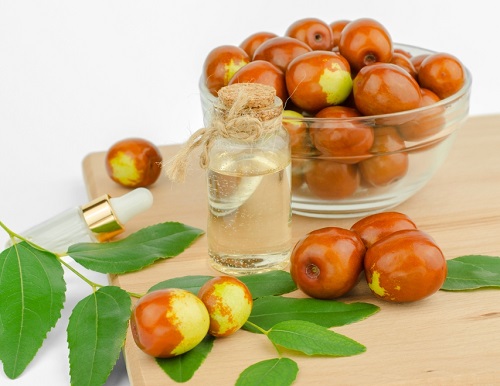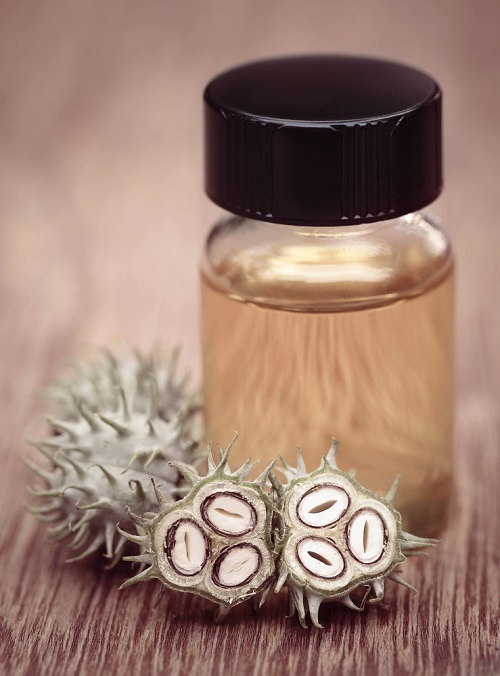This Jojoba Oil vs. Castor Oil guide will help you compare these two wonderful oils and decide the perfect fit for you!
When it comes to natural remedies for hair and skin care, the question often arises: ‘Jojoba Oil vs. Castor Oil—Which is Better?‘ This comprehensive guide will help you get the answer!
Jamaican Black Castor Oil vs. Castor Oil! Click here
What is Jojoba Oil?

Jojoba Oil originates from the seeds of the Simmondsia chinensis, a hardy shrub that thrives in the harsh desert climates of the southwestern United States. Extracted through cold-pressing, Jojoba Oil retains a wealth of nutrients, including vitamins E and B, copper, zinc, selenium, iodine, and chromium.
What sets Jojoba Oil apart is its uncanny similarity to human sebum, the natural oil our skin produces. This makes it easily absorbed, non-greasy, and intensely hydrating.
What is Castor Oil?
Castor Oil, on the other hand, is derived from the beans of the Ricinus communis plant, which is indigenous to the Mediterranean region, Eastern Africa, and India. The oil extraction process involves cold-pressing followed by heat treatment.
This oil is unique due to its high concentration (around 90%) of ricinoleic acid, a monounsaturated fatty acid with powerful anti-inflammatory and moisturizing properties. Castor Oil is viscous and has a slightly sticky texture.
Jojoba Oil vs. Castor Oil for Hair Growth
Jojoba Oil for Hair Growth
Extracted from the seeds of the Simmondsia chinensis plant, jojoba oil is uniquely similar to sebum, the oil naturally produced by our scalp. This allows it to effectively mimic sebum’s hydrating properties, keeping the scalp moisturized and reducing the risk of dandruff and dryness-induced itchiness.
Vitamin E is a powerful antioxidant that protects hair follicles against damage from oxidative stress, while Vitamin B aids in improving the hair’s elasticity. This helps in strengthening the strands and reducing breakage.
Furthermore, Jojoba Oil has antibacterial properties, which help keep the scalp clean and unclog hair follicles. By unclogging hair follicles, it ensures that your hair is not held back from its maximum growth potential. Over time, this can lead to visibly thicker and fuller hair.
Castor Oil for Hair Growth
Castor Oil, on the other hand, has a high concentration of ricinoleic acid. This unique fatty acid helps stimulate the prostaglandin E2 receptor, a compound that plays a critical role in hair growth.
When applied and massaged into the scalp, Castor Oil improves blood circulation, enhancing the supply of oxygen and nutrients to the hair follicles, which can result in healthier, stronger, and faster-growing hair.
In addition to ricinoleic acid, Castor Oil is also rich in other nutrients vital for hair growth, including vitamin E, proteins, and Omega 6 and 9 fatty acids. These nutrients nourish the hair, improve its overall strength, and protect it from environmental stressors.
Castor Oil vs. Jojoba Oil for Eyelashes
Jojoba Oil for Eyelashes
Though Jojoba Oil may not be the traditional choice for eyelash care, it shouldn’t be overlooked. As mentioned earlier, Jojoba Oil mimics our body’s natural oils, thus providing excellent hydration without being overly greasy.
When used on eyelashes, it can help to condition and moisturize the hair fibers, making them softer and less prone to breakage. Furthermore, Jojoba Oil’s vitamin E and B-complex can help to strengthen the eyelashes from the roots, promoting better health and potentially encouraging growth over time.
Castor Oil for Eyelashes
Castor Oil, however, has long been recognized as a potent lash enhancer. Its high ricinoleic acid content provides nourishment to the lashes, fortifying them and promoting healthier growth. Moreover, it forms a protective barrier on the lashes, preventing them from falling out or breaking prematurely.
With consistent application, users often notice their lashes becoming thicker and longer. Castor Oil’s deeply moisturizing nature also gives the eyelashes a glossier appearance, making them look more prominent and attractive.
Jojoba Oil vs. Castor Oil for Skin
Jojoba Oil for Skin
Being non-comedogenic, Jojoba Oil is an excellent moisturizer for all skin types, including oily and acne-prone skin. It works by forming a thin, non-greasy layer on the skin that helps to retain moisture without blocking the pores.
Furthermore, it helps regulate the production of sebum. This is especially beneficial for those with oily skin, as overproduction of sebum can lead to clogged pores and acne breakouts.
Jojoba Oil also possesses anti-inflammatory properties, helping to soothe irritation, reduce redness, and aid in the healing of inflammatory skin conditions like eczema and rosacea. The oil’s rich antioxidant content further helps to protect the skin from harmful environmental stressors, promoting overall skin health.
Castor Oil for Skin
Castor Oil’s high ricinoleic acid content gives it powerful anti-inflammatory benefits, making it an excellent option for sensitive or inflamed skin. Its ability to reduce inflammation and soothe irritated skin can be especially beneficial in managing conditions such as psoriasis and eczema.
Being a highly emollient oil, Castor Oil can deeply hydrate and moisturize the skin, helping to relieve dryness and keep the skin soft and supple. It also promotes wound healing and reduces signs of aging, such as wrinkles and fine lines.
However, due to its highly viscous nature, Castor Oil can feel heavy on the skin, making it best suited for individuals with dry skin. Those with oily or combination skin should use this oil sparingly to avoid clogged pores and potential breakouts.
Is Castor Oil Comedogenic? Learn here
Jojoba Oil vs. Castor Oil for Beard Growth
Jojoba Oil for Beard Growth
With A similar composition to the skin’s natural oil, jojoba oil is excellent at moisturizing not just the beard hairs, but also the underlying skin. It helps to prevent dryness and flaking, often known as “beardruff,” and keeps the skin underneath your beard healthy and comfortable.
Furthermore, Jojoba Oil can help to condition the beard, making it softer, and more manageable, and giving it a natural shine. Its vitamins and minerals nourish both the skin and hair, promoting stronger, healthier beard growth.
Castor Oil for Beard Growth
Castor Oil has a denser texture, which coats the hair and gives it a thicker appearance—something many men desire for their beards. Its high ricinoleic acid content also stimulates blood circulation, which can boost the supply of nutrients to the hair follicles. This promote healthier and faster beard growth.
By deeply moisturizing the hair, Castor Oil also helps to prevent beard breakage, ensuring that your beard not only grows faster but also longer. Learn more about its benefits here.
However, due to its thickness, it’s best to use Castor Oil sparingly or mixed with a lighter oil like Jojoba Oil, to avoid a greasy look.
Castor Oil vs. Jojoba Oil for Acne
Jojoba Oil for Acne
Jojoba Oil’s non-comedogenic property means it won’t clog pores, a key factor in the development of acne. By regulating sebum production, Jojoba Oil helps prevent excessive oiliness that can lead to acne breakouts.
Additionally, its anti-inflammatory and antibacterial properties help to soothe inflamed acne and prevent acne-causing bacteria from proliferating, making Jojoba Oil an excellent choice for acne-prone individuals.
Castor Oil for Acne
Castor Oil has antimicrobial properties that can help fight acne-causing bacteria. Its anti-inflammatory properties can also reduce swelling and redness associated with acne.
Moreover, its deep cleansing capabilities allow it to penetrate the skin and draw out dirt, bacteria, and dead skin cells. These are often the culprits behind acne breakouts.
However, due to its high viscosity, Castor Oil should be used cautiously on acne-prone skin. It can potentially clog pores if not properly removed, leading to further breakouts.
Jojoba Oil vs. Castor Oil—Which is Better?
In the Jojoba Oil vs. Castor Oil debate, the winner largely depends on your personal skin and hair needs. Both oils have unique and impressive benefits.
You might even find that using both oils—perhaps jojoba oil for your face and castor oil for hair growth—gives you the best results.
Always remember to do a patch test when trying a new oil and to source your oils from reputable suppliers. Enjoy the journey to naturally radiant skin and hair with these botanical wonders.

